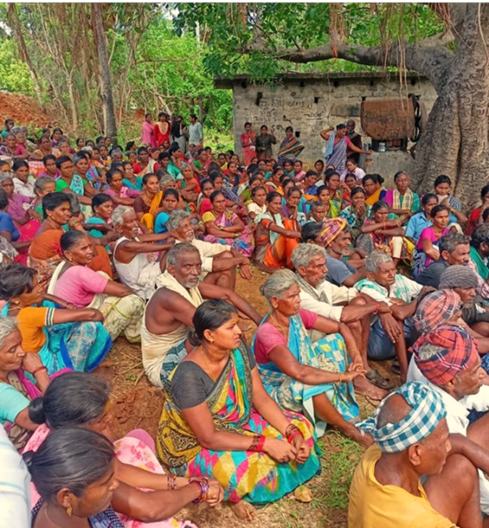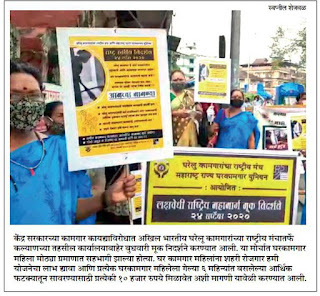Today the MO* published an article of mine as worldblogger, regarding the informal economy and the work some of our partners are doing in this field in South Asia. Here the English translation:
This
article is about something I personally think of as one of the biggest
challenges currently on the labor market, one that is visible at the global
level, but which can be witnessed locally everywhere: how increasingly, work is
done informally, how jobs get less suited up or taken away the warm clothes,
how labour is being undressed progressively, sometimes to just an illusion, to
the shameful nakedness of the emperor.
 Speaking of
clothes, let’s look at a clothing factory that shuts down here in South Asia. Because
of the crisis, or for some other reason. All of the workers are laid off. But
they can continue to deliver to the manufacturer, but must work from home. They
are explained that they get paid per piece made, and can choose their own
hours. No supervision, organize yourselves, no transport costs anymore, working
from home, sounds nice, no? The koolies carry bales of cotton from the supplier
to their houses and the processed fabrics back. They also get paid, per trip. Let’s
say one of the women starts her own seamstress shop, next to her household
duties. A daily worker, still dusty from work in the fields, asks her to make him
a sari for his fiancée, to be part of the dowry. That fiancé works, in addition
to the vegetable garden of which she sells half the produce, as a domestic
worker for five families. She cleans the house and makes the food, and each
family pays her a different amount, according to the tasks they are doing
there.
Speaking of
clothes, let’s look at a clothing factory that shuts down here in South Asia. Because
of the crisis, or for some other reason. All of the workers are laid off. But
they can continue to deliver to the manufacturer, but must work from home. They
are explained that they get paid per piece made, and can choose their own
hours. No supervision, organize yourselves, no transport costs anymore, working
from home, sounds nice, no? The koolies carry bales of cotton from the supplier
to their houses and the processed fabrics back. They also get paid, per trip. Let’s
say one of the women starts her own seamstress shop, next to her household
duties. A daily worker, still dusty from work in the fields, asks her to make him
a sari for his fiancée, to be part of the dowry. That fiancé works, in addition
to the vegetable garden of which she sells half the produce, as a domestic
worker for five families. She cleans the house and makes the food, and each
family pays her a different amount, according to the tasks they are doing
there.
Eight out
of ten people in South Asia work in this kind of jobs, placed under the vague banner
of the informal economy. South Asia is the region with the highest percentage
of people who work in the informal economy. In Nepal for example, these
informal jobs account for 40% of the GDP. It is usually work without a clear
wage, regulations or status. Some see it as the solution for the ‘south’: no
bureaucracy or strict measures, but free market, no curbing of the creativity
of the people. But trade unions do see structural problems: workers without
identification, no written contract of employment, no certainty when the next
income will arrive, no guaranteed safe working conditions or coverage in case
of work related accidents, unlimited hours, workers who are excluded from
social security systems and have no protection by collective bargaining
agreements or access to unions that defend their interests. Often, they are
relatively unskilled workers, who work long hours for low wages and contribute
relatively little to the national production (though they are essential for the
running of the economy). It reduces labour to the bare minimum, work outside of
a framework or any regulations.
Are these
people employed or self-employed? When can it be considered as an employment
contract (whether oral or written), and hence are the labour legislation and
international conventions applicable or not? Is there a link of subordination,
who is responsible for what?
Some feel
this question might only seem relevant for the 'south', but less for western
economies and societies? When talking about informal economy in Europe, many
seem to think undocumented migrant workers. Yet informal economy is present in
the west on a larger scale than we think. Belgians for instance are notorious
for undeclared or ‘black’ work. For the EU, this shadow economy is estimated to
be between 7 and 16% of GDP, Belgium around 15%. For the EU, this means between
10 and 28 million full-time jobs. Consider also the introduction in 2014 of the
so-called "black box", which registers all manipulations of a cash
register used in bars and cafes, and we can imagine why it provoked such a wave
of protest? And the apparently very sympathetic system, über, by which anyone
with a smartphone can become a taxi driver, also a form of informal economy?
Let me
provide some possible answers on challenges from South Asia before turning to other
questions still unresolved. The Indian trade union CFTUI, a partner of World
Solidarity (WSM), tries to involve the informal economy in their union work.
Because informal employers are often not willing or able to provide certificate
attesting that a person is exercising a given profession, and therefore can enroll
to specific rates for social security schemes, the Indian state, after
consultation with the social partners, accepted that unions could deliver such
a certificate. This leads to a win-win-win: the social security system gets
more contributions and therefore can offer a wider protection, the union gets
more members and can better defend their interests and the employee, despite
his/her lack of status, still gets access to health insurances or pension
schemes.
In Nepal,
the two largest trade unions, GEFONT and NTUC, both partners of World
Solidarity (WSM), provide vocational training and education to home based
workers. This involves for example, knitting sweaters and hats, or shops as
tailors. They organize these workers into groups by region or district. Hence,
to avoid competition, hairdressers of the capital Kathmandu agreed on certain rates
to be used, or that no new hairdresser was to open in a radius of 150m of an
existing salon.
However,
there remain problems: these people act and think often as self-employed, and
the entire trade union work or training on labor rights holds little appeal to
them. They often have family members help them in the business or hire other
people to help them. Sometimes I wonder whether the union is then not starting
to function as a guild, which defends the interests of a particular 'craft',
but which lacks the collective working, labour rights ideology. Or is this a necessary
evil to contribute to formalizing the informal economy?
Another
question currently arising is regarding the social security fund which is under
construction in Nepal. Employees would contribute 11% of their wages, employers
20+ 11% and the state would manage the system. This of course raises the
question for the informal workers: who will contribute for them? The answer
might depend per sector: for example, in the construction sector, with many
informal workers, one might increase the building permit by 20% and use those
funds to cover all employees against work accidents.
These are
all steps which can offer a better status and protection to workers. And the
International Labour Organisation (ILO) also focuses on this issue, which is
going to be the hot item during the upcoming ILO conventions, with the aim of
formulating a recommendation on the informal economy to all member states.
Let's see if we can get that creature dressed...



























